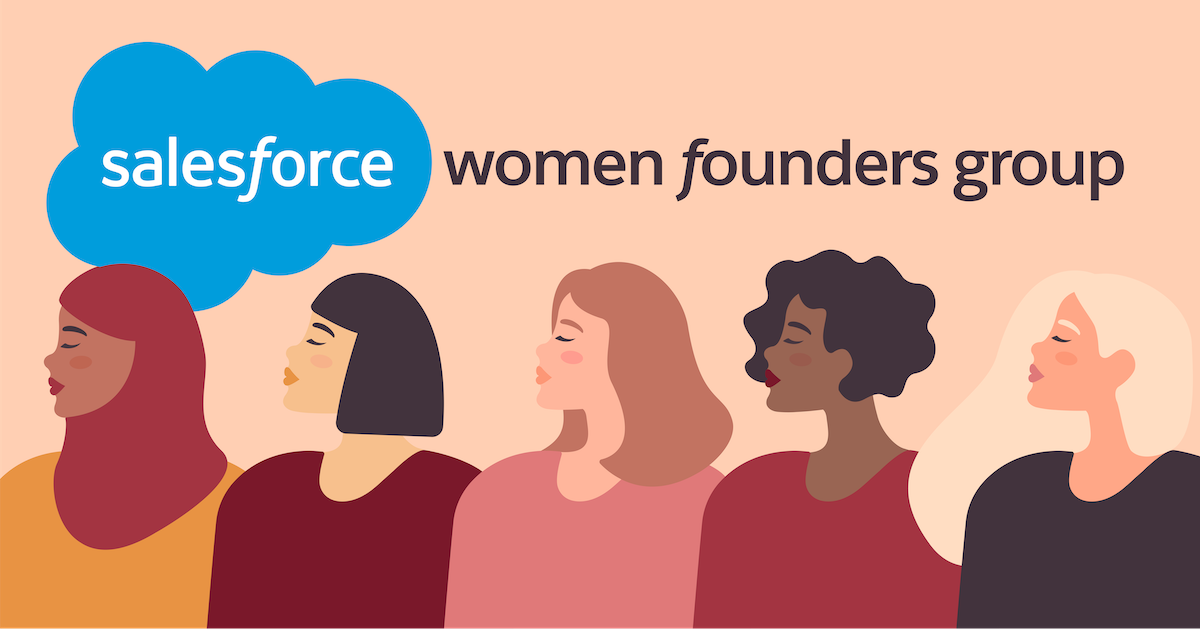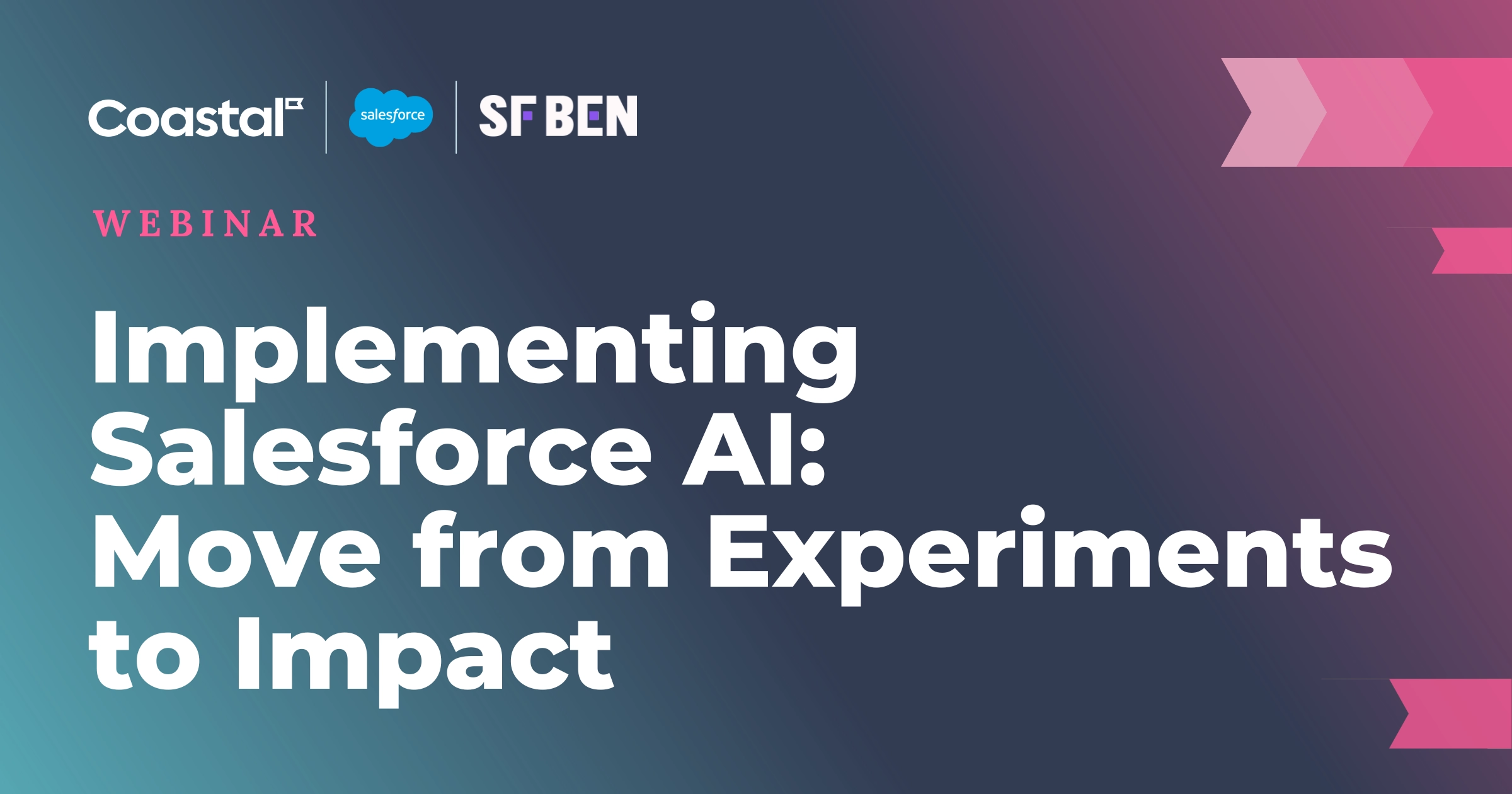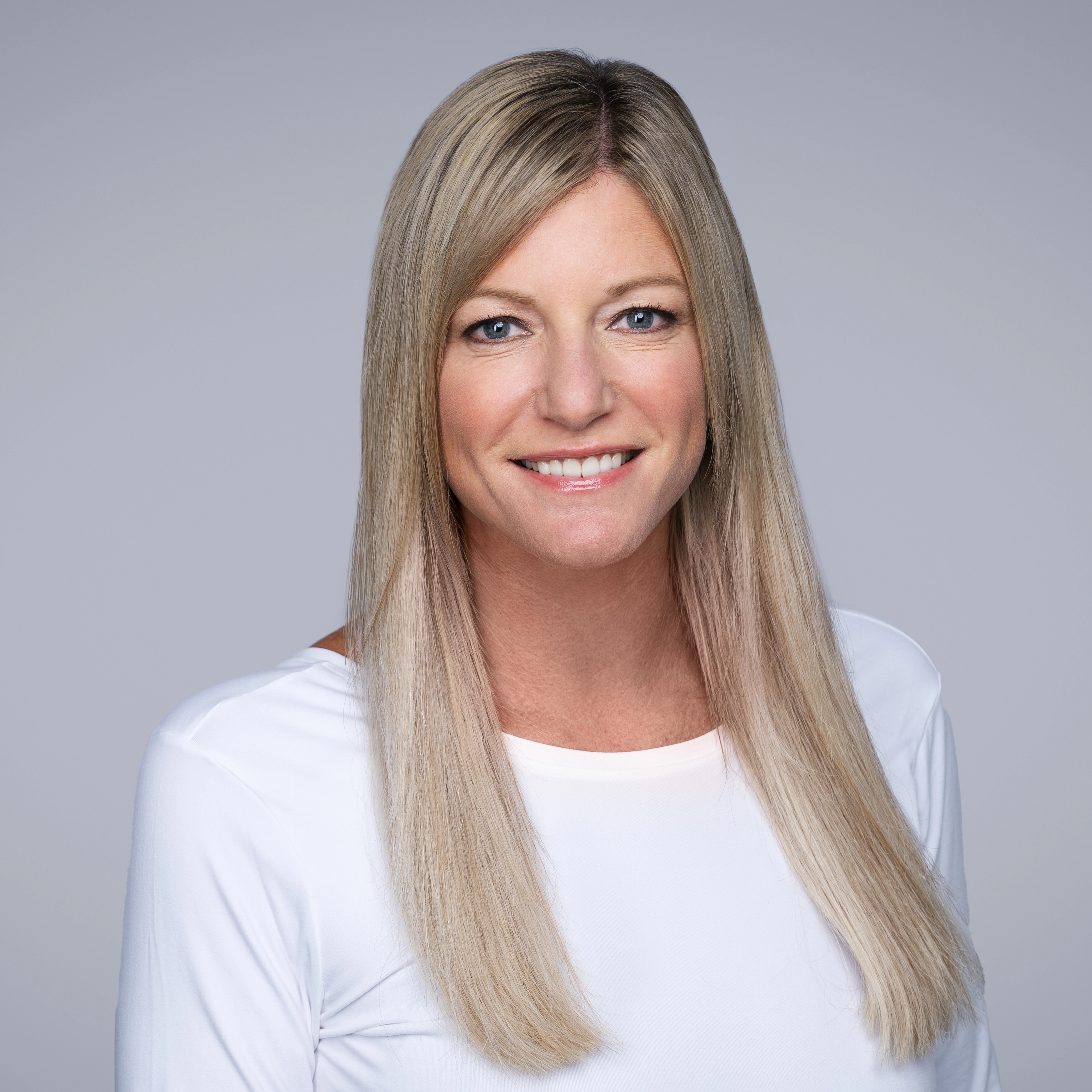By: Molly Lorenz, Salesforce Partners Communications Director
Originally published on Medium
March was Women’s History Month, a time when we celebrate the vital role of women in America. It also marked the announcement of our newest global partner cohort, the Salesforce Women’s Founders Group. Through its inaugural “Rise & Shine” event hosted on LinkedIn Live, we were able to come together virtually to share stories of struggle, success, mentorship, and camaraderie as women entrepreneurs, professionals, and partners in the Salesforce ecosystem.
Missed the event? Watch the replay here.
The event was co-hosted by Sara Hale, Founder & CEO of Coastal Cloud and Leader of Women Founders, along with Salesforce’s Partner Diversity & Inclusion Director, Minea Moore, and included two-panel discussions featuring women leaders across continents, industries, and expertise. Let’s take a deeper dive into the enlightening and meaningful things they had to say.
Why Groups Like Women Founders Are Important
Women like those in the Salesforce ecosystem are powerful leaders at all levels, driving change, serving customers, and promoting innovation from fresh and unique perspectives. But there are still large gaps that exist for women in business across industries and regions:
- In 2020, only 2.3% of venture capital went to women-owned enterprises.
- In the tech industry, about 20% of entry- and mid-level employees are women, which drops to 16% in middle management and 10% of executives.
- On average, women-owned businesses are smaller, average sales are lower, they are less likely to be employers, and they have fewer employees.
- 2.2 million women have left the labor market since the beginning of the pandemic.
- For every dollar of investment raised, women-led startups generated 78 cents in revenue, whereas startups led by men generated only 31 cents.
The pandemic has only widened these gender inequality gaps. As of February 2021, nearly three million women had left the workforce due to childcare reasons, with Black mothers, Hispanic mothers, and single mothers among the hardest hit. At a time when women may be feeling unsteady in their careers, we believe it’s important to rise and shine together.
“Showcasing or spotlighting women in tech and entrepreneurship illuminates the opportunities that the next generation of women leaders can follow, and it further motivates those of us who are already in our careers,” said Minea Moore, Director of Partner Diversity and Inclusion at Salesforce.
Panel 1: Developing Women Talent in Your Company
Panel 1 featured four Trailblazing women in addition to moderator Sara Hale on the topic of recruiting and developing women talent. Read more about the panelists here. Let’s take a look back at some of the conversations.
How can companies pursue a diverse talent pool from traditional and non-traditional sources?
REENA: There is no traditional or non-traditional talent pool. We all have talent, it’s just a matter of finding the right environment and support system to nurture it. The work I’m doing at Mom Relaunch is just proving that point over and over again. Most of the time, people, when they are not confident enough, even if they’re talented, they lose that whole opportunity…Learning how to write code [and similar talents] — these are hard skills you can always learn, but the soft skills you get as being part of a community, the confidence level, the environment, and your peer support is very important. The four-step model we created can be easily replicated to any talent pool.
TAMMY: Small steps count. At Virsys12, we’ve hired women that have been out of the workforce for 10 or more years to raise their families. They come into our company with this energy and drive. That’s what’s made them successful, and they make some of the best employees. We’ve also been successful bringing in women who are changing careers. There’s this huge talent pool in women that may have had other careers and want to get into technology. Sometimes tech is seen as a young person’s career, but I see it as a career for people who really want to make change.
How can we grow our talent to be more entrepreneurial?
TIFFANY: One way we’ve found at Esor is to constantly let our employees take on new challenges, whether stepping into a new role, leading a project that is a different area or product than they’re used to, or supporting them to step outside of their comfort zone. Communicating with your employees to find out what their goals are and putting them into positions where they can stretch and feel safe to rise to the occasion — that helps grow those entrepreneurial skills.
JAMIE: At TaskRay, we do communications training. While that is something everyone can benefit from, in particular women first starting in the workforce, it really supports them to be clear, concise, and confident in their communications, which underlies a lot of people’s ability to go out and be entrepreneurial within their organization. From my own benefit, I’ve been doing this training for the past two year. It has helped me grow tremendously and present my ideas a lot more confidently and clearly and move them forward.
What can we do to get more support from allies to achieve diverse workplaces?
TIFFANY: It’s not a secret…there’s a lot of research out there that talks about the benefits both to your bottom line and to your culture when you increase diversity in your company. It allows you to have more people that can connect with your clients on a different level outside of just the service you’re offering. Your clients love to know that you not only have technical expertise, but other areas they can connect with you and know you understand how they work in the communities they come from and serve.
JAMIE: Women already wear a lot of hats in society and in their homes, and for women to be empowered to achieve more in their career, not only do they have to have allies outside of work, but at work as well. A lot of men really do want to be allies. But it’s not readily apparent how they can be allies. Some of it is about education — what you can do to check biases around women in leadership, give women more opportunities to speak, and showcase talent.
Panel 2: Building a Career in Tech and Entrepreneurship
Panel 2 featured three Trailblazing women in addition to moderator Minea Moore on the topic of building a career in tech and entrepreneurship. Read more about the panelists here.
What are some of the benefits you’ve realized from entrepreneurship?
DEENA: Make no mistake, there’s a lot of work that goes into being an entrepreneur. It takes an enormous amount of leadership, problem solving, and “stomach” to deal with the stresses. But for me, the best jobs are the ones where you love the people you work with. You’re enjoying the work environment. You feel like you’re making an impact. At Pacific Point, I have this ability to shape and manage meaningful work with an amazing team. That’s what’s made this journey special.
What are some of the unique challenges that keep you up at night as an entrepreneur?
VERA: It’s a very humbling experience. I’m marketing, sales, delivery — everything — all in a single body. We underestimate, when we’re part of a big brand, how much awareness that carries with it. I thought being part of the Salesforce ecosystem for so long would make it easy to make connections, but it was hard for people to understand Solution Junkies and its unique value. It’s hard to do the day in and day out of motivating a team, while trying to build a brand.
NICALE: For me, it’s putting myself out there and the networking it requires. Some women (and men as well) have a difficult time speaking highly of themselves and convincing people they can do the work. In addition, it’s challenging to find really good resources and bringing on talent to deliver those solutions. At Southpoint Consulting, we’re constantly recruiting, and we’re competing with the big guys who are also able to secure that talent.
DEENA: I would say raising capital and looking at VC funding were not challenges for me. I made a decision to have a more organic growth path for our company. As an entrepreneur, making those big decisions about funding are super critical. It isn’t for everyone to get funded in that way and be accountable to a board. Right here, right now though, building a team is the main thing I think about all the time. How can I make processes better? How can I make them feel more connected? How can I help them develop new skills and try new things? It’s an art to understand people and how it fits with your business.
How can you create value differentiation as a smaller firm?
VERA: We’ve worked really hard to cultivate talent that has a lot of Salesforce experience. When we go to clients, we say ‘These people are experts. They’re the same people you would get if not better at the big firms.’ But because of our flexibility in our business model, we can give it to you at a price you can actually afford. We don’t have the R&D costs and all of the overhead that comes with running a big organization.
NICALE: Our clients have direct access to leadership if something goes wrong. Plus, we have relationships with the big companies, so if we get a project and we need additional strength, we can leverage those partnerships and bring them on as sub-contractors.
How can we work as a community to support one another?
NICALE: Mentorship. Young people can find a mentor — find someone who’s doing it, interview them, and understand what they’re doing. LinkedIn is a good way to reach out and put yourself out there. I had a lot of people who were able to help me and give me advice in my career. So I know how important and helpful that is in terms of figuring out your path.
VERA: The Salesforce opportunity is massive. There is more work than all of us combined could ever serve. Trying to constantly go after the same thing is silly. If we banded together and partnered more, we’d be so much better served. During the pandemic, there were a lot of consultancies that were genuinely struggling. You don’t want to see somebody go out of business. That’s not good for anyone.
To learn more and hear about each panelist’s career journey, listen to the full event here.






